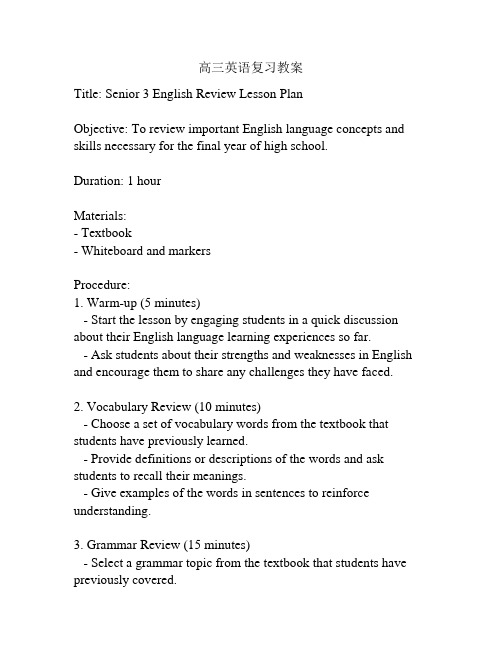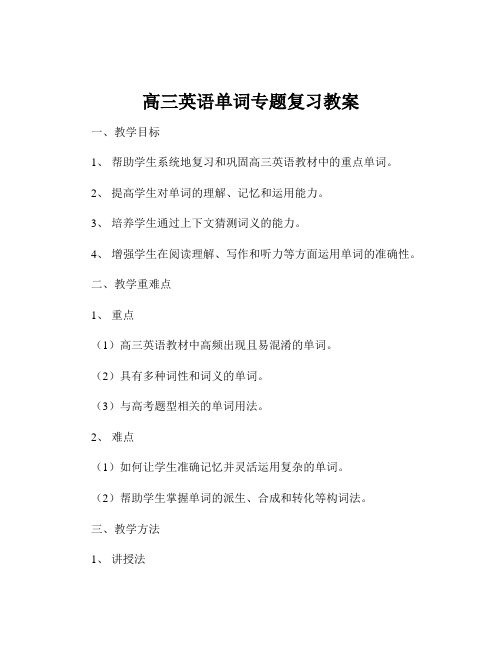高三英语复习教案(8)a
高三英语复习课教案

高三英语复习课教案高三雷英名词从句(Noun Clauses)I.Teaching Aims:To ask the students to master the usage of noun clauses and use it freely when communicating with each other.II.Difficulties and Emphasis:How to distinguish the noun clauses.How to tell the appositive clause from the attributive clause.III.Teaching Tools:Multi—mediaIV.Teaching Processes:Step1. Review the Attributive clause. (5 minutes)Step2. Presentation (computer) (5 minutes)Showing the students some sentences, ask them to analyse the sentences, making sure they can tell every part of speech, especially subject、object、predictive and appositive.Step3. Explanation (Looking at the screen) (20 minutes)The usage of noun clauses:名词从句包括主语、宾语、表语和同位语等从句。
它们可以由下列连词引导:从属连词that, whether, if;连接代词who(ever), whom, whose, what(ever), which(ever);连接副词when, where, why, how, how much / many /long /often 等。
高三英语复习教案

高三英语复习教案Title: Senior 3 English Review Lesson PlanObjective: To review important English language concepts and skills necessary for the final year of high school.Duration: 1 hourMaterials:- Textbook- Whiteboard and markersProcedure:1. Warm-up (5 minutes)- Start the lesson by engaging students in a quick discussion about their English language learning experiences so far.- Ask students about their strengths and weaknesses in English and encourage them to share any challenges they have faced. 2. Vocabulary Review (10 minutes)- Choose a set of vocabulary words from the textbook that students have previously learned.- Provide definitions or descriptions of the words and ask students to recall their meanings.- Give examples of the words in sentences to reinforce understanding.3. Grammar Review (15 minutes)- Select a grammar topic from the textbook that students have previously covered.- Explain the grammar rule and provide examples.- Ask students to complete a few practice exercises to reinforce the concept.4. Reading Comprehension (15 minutes)- Choose a short passage from the textbook or create a passage that showcases a variety of reading comprehension skills.- Read the passage aloud, and then ask students to answer a set of comprehension questions related to the passage.- Discuss the answers as a group and provide explanations for any incorrect answers.5. Listening Comprehension (10 minutes)- Prepare a short audio recording or find one online that includes different types of listening activities, such as multiple-choice questions, gap-filling, or dictation.- Play the recording for the students and have them answer the questions or complete the activities.- Review the answers as a class and provide feedback on listening skills.6. Writing Practice (15 minutes)- Provide a writing prompt related to a topic covered in the textbook or a current event.- Ask students to write a short composition or essay within a specific time limit.- Collect the papers and give brief feedback or suggestions for improvement.7. Wrap-up (5 minutes)- Summarize the key points reviewed during the lesson.- Discuss any questions, concerns, or areas where students feel they need more practice.- Encourage students to study and review regularly to be well-prepared for the upcoming examinations.Note: This lesson plan can be adjusted according to the specific needs and content of the English curriculum being reviewed.。
高三英语单词专题复习教案

高三英语单词专题复习教案一、教学目标1、帮助学生系统地复习和巩固高三英语教材中的重点单词。
2、提高学生对单词的理解、记忆和运用能力。
3、培养学生通过上下文猜测词义的能力。
4、增强学生在阅读理解、写作和听力等方面运用单词的准确性。
二、教学重难点1、重点(1)高三英语教材中高频出现且易混淆的单词。
(2)具有多种词性和词义的单词。
(3)与高考题型相关的单词用法。
2、难点(1)如何让学生准确记忆并灵活运用复杂的单词。
(2)帮助学生掌握单词的派生、合成和转化等构词法。
三、教学方法1、讲授法通过讲解单词的发音、拼写、词义和用法,让学生对单词有初步的了解。
2、练习法安排适量的练习题,如填空、选择、翻译等,让学生在实践中巩固所学单词。
3、情景教学法创设具体的语言情景,让学生在实际语境中理解和运用单词。
4、小组合作学习法组织学生进行小组讨论和合作学习,共同解决单词学习中的问题。
四、教学过程1、导入(5 分钟)通过播放一段英语电影片段或英语歌曲,引出本节课要复习的单词主题。
例如,如果影片中出现了“academic”这个单词,就可以以此为切入点,开始关于学术类单词的复习。
2、单词讲解(20 分钟)(1)按照单词表的顺序,依次讲解重点单词的发音、拼写、词义和用法。
例如:“accommodation”,发音为əˌkɒməˈdeɪʃn,名词,意为“住处;住宿;膳宿”,常用短语有“provide accommodation 提供住宿”“make accommodation 安排住宿”。
(2)讲解单词的派生、合成和转化等构词法,帮助学生扩大词汇量。
比如:“able”是形容词,加上后缀“ility”就变成了名词“ability(能力)”;“class(班级)”加上后缀“room”就合成了“classroom(教室)”;“water(名词,水)”用作动词时意为“浇水”。
(3)结合例句和语境,让学生更好地理解单词的用法。
给出句子:“He has the ability to solve the problem”让学生体会“ability”在句中的用法。
英语高三复习教案范文集锦

英语高三复习教案范文集锦全面贯彻“三个面向”战略指导思想,渗透和灌输可持续发展的战略思想。
以素质教育为根本宗旨,以培养创新精神和实践能力为重点,充分发挥学生的潜能,提高学生的全面素质和自学能力。
那么在学习英语的过程中有哪些教案会比较好呢?以下是小编带来的内容,感谢您的阅读,希望能帮助到您!英语高三复习教案1《Fit for Life》Fit for Life新课标单词historian n. 历史学家 recipe n. 处方;食谱,菜谱 physician n. 医生,内科医师bark n. 树皮;(狗)叫,吠 vi. (狗)叫,吠 chemist n. 药剂师;化学家trial n. 试用;试验;考验 tablet n. 药片;写字板,书写板standardize vt. 使符合标准,使标准化 best-selling adj. 畅销的painkiller n. 止痛药,镇痛剂 author n. 作者 heart attack 心脏病发作thin vt. & vi. (使)变稀,(使)变薄,(使)变淡;(使)变细block vt. 阻塞,阻挡;妨碍 length n. 长度 contemporary adj. 当代的;同时代的Scottish adj. 苏格兰的 note vt. 发现,注意到;记录 transparent adj. 透明的application n. 应用,运用;申请 name vt. 命名,给……取名unable adj. 不能的,不会的 chemical adj. 化学的 purify vt. 使纯净,净化,提纯quantity n. 量,数量 widespread adj. 普遍的,普及的,广泛的lung n. 肺mass adj. 批量的,大量的,大规模的;群众的,民众的n. 团,块,堆;较大部分,主体部分;体积,大小,群众,人群rapidly adv. 迅速地,快速地 powerful adj. 效力大的,强效的wonder adj. 非凡的,奇妙的,奇特的,神奇的n. 奇迹,神奇;奇观;惊奇,惊讶millions of 数百万的,大量的 relief n. 减轻,缓解;轻松,宽慰;救济,救助potential adj. 潜在的,可能的 enquiry n. 询问,咨询 ward n. 病房fundamental adj. 基础的,根本的;重要的,至关重要的handful n. 少数,少量;一把 annual adj. 每年的,一年一次的arrangement n. 安排;排列 receptionist n. 接待员,招待员pleasure n. 愉快,快乐;乐事 eyesight n. 视力 adjustable adj. 可调节的magic adj. 有魔力的,不可思议的,魔术的 needle n. 针 art n. 技艺,技术sharp-edged adj. 有锋利边缘的 swollen adj. 肿胀的 arrowhead n. 箭头;箭头状物sharp adj. 锋利的锐利的;尖的;突然的,急转向的;尖刻的,辛辣的;灵敏的,敏锐的fine adj. 细的,纤细的 point n. 点,位置;尖端;要点;分数insert vt. 插入;嵌入 symptom n. 症状 function n. 功能,作用heartbeat n. 心跳 addiction n. 上瘾,沉溺,入迷 overeating n. 过量饮食relieve vt. 减轻(病痛、忧虑、负担等),缓解;救济,救助 unclear adj. 不清楚的课文出现短语1. keep us healthy2. open up3. carry out4. give up5. come true6. figure out7. go wrong 8. put off 9. put up with 10. make out 11. call back 12. look out for13. at certain points 14. find out 15. if so 16. recommenddoing17. in contemporary society 18. in large quantities 19. trun into20. be fundamental to (doing) 21. a disease called malaria 22. look into23. look down upon 24. put through 25. come up 26. remind sb to do27. be based on 28. block from doing 29. focus on 30. reduce the risk of31. try out 32. due to 33. in addition to 34. have an influence on35. leave behind 36. ask for 37. set up 38. put off39. take measures to do 40. let … out of 41. be connected with一.单词应用根据单词的首字母或汉语意思填写正确单词,注意形式变化。
高三英语一轮复习教案5篇

高三英语一轮复习教案5篇高三英语一轮复习教案5篇教学计划是教学活动得以顺利进行的基本保证。
好的教学设计可以为教学活动提供科学的行动纲领,使教师在教学工作中事半功倍,取得良好的教学效果。
以下是带来的高三英语一轮复习教案内容,感谢您的阅读,希望能帮助到您!高三英语一轮复习教案1高考是以考查学生英语运用能力为主的。
高考英语试题基本上是一套能力测试题。
目前高考英语试题在重视英语基础知识的同时,突出考查语言运用能力,形成了以篇章阅读为主体的试题布局。
高考复习首先要明确复习目的,理清思路。
高三复习的过程不应是对已学知识的简单重复和强化,而是一个再学习、再认识、提高理解能力和运用能力的过程。
高三复习的最终目的是提高学生的语言运用能力,如果还是按照传统的串讲课文的方法进行复习,在这么短的时间内达到复习目的是不可能的,因为语言运用能力只-串讲课文是培养不出来的,特别是阅读能力。
因此,在短暂的高考复习中兼顾语言知识的掌握和语言能力的培养是值得广大教师认真探讨的课题。
针对高考英语侧重考察考生的语言和理解能力的显著特点,如何制定出一套较好的科学的英语复习方案,在最后的几个月时间里尽量提高学生英语语言的运用能力成了大家甚为关注的问题,也常常是大家话题讨论的焦点。
本文主要谈谈在关于第一轮系统复习中我们的一些做法及笔者个人的一些看法。
一、构建知识网络,落实双基——提高能力的保证既然复习知识是为了运用知识,那么什么样的知识便于运用和有利于学科能力的培养呢?这就是网络化的知识,这才是形成学科能力的坚实基础。
如果学生的知识能形成网络,那么他们一定对所学的教材进行了层层挖掘,这必然对其实现知识向能力的迁移有重要的影响,有利于他们实际运用能力的提高,并且使他们在应考中运用自如。
知识是能力的基础,对能力的测试不可避免地要结合对知识的测试,这是对学生累积的、系统化的、活化的知识的测试。
大量的知识考查通过能力测试得以实现,熟练掌握英语基础知识正是为发展英语运用能力做准备。
高三英语单词专题复习教案

高三英语单词专题复习教案一、教学目标1、帮助学生系统复习和巩固高三英语教材中的重点单词。
2、提高学生对单词的理解、运用和拼写能力。
3、培养学生通过语境猜测词义的能力。
4、增强学生对英语单词学习的兴趣和信心。
二、教学重难点1、重点(1)掌握高频词汇的词义、用法和搭配。
(2)熟练运用单词的变形规则,如名词复数、动词时态、形容词和副词的比较级和最高级等。
2、难点(1)区分易混淆单词的词义和用法。
(2)在语境中准确运用所学单词进行表达。
三、教学方法1、讲授法:讲解单词的词义、用法和搭配。
2、练习法:通过练习题巩固所学单词。
3、情境教学法:创设语境,帮助学生理解和运用单词。
4、小组合作学习法:组织学生进行小组讨论和合作练习,培养学生的合作能力和交流能力。
四、教学过程1、导入(1)通过播放一段英语视频或展示一篇英语短文,引导学生关注其中的重点单词,激发学生的学习兴趣。
(2)提问学生在阅读或听力中遇到的单词难题,了解学生的单词掌握情况。
2、单词梳理(1)按照教材单元顺序,依次复习重点单词。
(2)讲解单词的词义、词性、用法和搭配,结合例句帮助学生理解。
例如:“accommodation”,名词,意为“住处;住宿;膳宿”,常用搭配“provide accommodation 提供住宿”“book accommodation 预订住处”。
3、单词变形(1)复习名词复数、动词时态、形容词和副词的比较级和最高级等变形规则。
(2)通过练习,让学生熟练掌握单词的变形。
例如:写出“difficult”的比较级(more difficult)和最高级(most difficult)。
4、易混淆单词辨析(1)将易混淆单词进行对比讲解,分析它们在词义、用法和搭配上的差异。
比如:“affect”和“effect”,“affect”是动词,意为“影响”;“effect”是名词,意为“影响;效果”。
(2)通过例句和练习,帮助学生区分和正确使用易混淆单词。
高三英语二轮复习教案精选5篇
高三英语二轮复习教案精选5篇高三英语二轮复习教案精选5篇作为一名英语老师,制定好一份英语教案,将会使你工作更加轻松。
下面是我为你预备的高三英语二轮复习教案,快来借鉴一下并自己写一篇与我们共享吧!高三英语二轮复习教案【篇1】一、教学指导思想英语的学习,首先要突出同学主体,敬重个体差异,让同学在老师的指导下构建学问,自主的去学习,而不是始终被动的接受学问。
既同学通过英语学习和实践活动,逐步把握英语学问和技能,提高语言实际运用力量的过程,拓展视野,丰富生活经受,开发思维力量,进展共性和提高人文修养的过程。
在本学期的英语教学中,要坚持面对全体同学,关注同学的情感,激发他们学习英语的爱好,帮忙他们建立学习的成就感和自信念,使他们在学习过程中进展综合语言运用力量,提高人文素养,增加实践力量,培育创新精神。
整体设计目标,体现敏捷开放,目标设计以同学技能,语言学问,情感态度,学习策略和文化意识的进展为基础;提高技能,磨练意志,活跃思维,呈现共性,进展心智和拓展视野;采纳活动途径,提倡体验参加,即采纳任务型的教学模式,让同学在老师的指导下通过感知、体验、实践、参加和合作等方式,实现任务的目标,感受胜利;注意过程评价,促进同学进展,建立能激励同学学习爱好和自主学习力量进展的评价体系。
该评价体系由形成性评价和终结性评价构成。
在教学过程中以形成性评价为主,注意培育和激发同学的乐观性和自信念;开发课程资源,不只是通过教材来教同学学问,给同学供应贴近同学实际,贴近生活,贴近时代的内容健康和丰富的课程资源,要乐观利用音像、电视、书刊杂志、网络信息等丰富教学资源,拓展学习和运用英语的渠道。
二、教材分析本学期所授课程为一般高中课程标准试验教科书英语模块必修(1)和必修(2)两个模块。
(人教版)共10个单元内容。
该教材贯彻了新的教学理念,以同学为中心,转变了传统的以学问内容为本的结构体例,代之以力量为本的多样化的结构体例,以语言技能和语言学问为主线,融入学习策略的教学以及情感态度和文化意识的培育。
高中英语教案(优秀8篇)
高中英语教案(优秀8篇)高中英语教学设计篇一单元整体设计思路第一课时:阅读课Warming up; Pre-reading; Reading; Comprehending (pp. 1-2)第二课时:语法课Discovering useful structures (p. 4); Using structures (p. 43)第三课时:阅读与听说课Reading and listening; Speaking (pp. 5-6)第四课时:词汇课Discovering useful words and expressions (p. 3); Using words and expressions (p. 42)第五课时:听说课Listening; Talking (p. 41)第六课时:读写课Reading and writing (p. 7)第七课时:单元评价课Self-test and self-evaluation; Summary第一课时阅读课一、教学内容Warming up; Pre-reading; Reading; Comprehending (pp. 1-2)二、教学目标在本节课结束时,学生能够了解文化遗产的基本概念、本质特点以及基本类型。
通过找读(scanning)关键词、略读(skimming) 和精读(careful reading),了解有关琥珀屋的故事。
用归类法学习词汇。
用自己的话复述琥珀屋的故事。
运用本课时学习的内容和自己已有的知识讨论相关话题。
三、教学步骤步骤一热身1.请学生看学生用书p. 1或者PPT中的图片,两人一组讨论三个问题。
教师请几组学生回答问题,然后综合大家的看法总结出文化遗产的定义。
2. 请学生说出一些中外文化遗产的名称,教师写在黑板上。
可以采取小组竞赛的形式,比一比看哪组说得多、说得正确。
注:问题中出现了五个生词。
rare, valuable和survive很难根据上下文猜出词义,教师可以布置学生课前查字典自学其词义,用法可以留到词汇课处理。
- 1、下载文档前请自行甄别文档内容的完整性,平台不提供额外的编辑、内容补充、找答案等附加服务。
- 2、"仅部分预览"的文档,不可在线预览部分如存在完整性等问题,可反馈申请退款(可完整预览的文档不适用该条件!)。
- 3、如文档侵犯您的权益,请联系客服反馈,我们会尽快为您处理(人工客服工作时间:9:00-18:30)。
高三英语复习教案(8) (SB3-units15-16)
一、单元考点提示 1.单词 dip into here and there in a word once again look out for above all refer to shut up key to in other words take turns look over one’s shoulder remind sb. of offer(n.) fix a date for on one’s way to show sb. around have a gift for offer„to lead to so long as hear sb.’s advice value(v.) call in after all eat up report sb. to sb. work out 2.句型 Will you come to„? Yes, I’d love to„ Would you like to„? Yes, that’s very kind/nice of you. I’d like to invite you to„ I’d love to, but„ I’m sorry„ That’s nothing I apologize„ Never mind. Please excuse me„ It’s not important. I’m afraid„ That’s all right/OK I ought to„ Don’t worry. What a shame! Forget it ! 3.语法 复习句子成分——谓语 复习被动语态
二、考点精析与拓展 1.swallow vt.吞吃;不嚼就吃下去 She swallowed the medicine with the help of some water. 她用水把药送下去了。 He just swallows his food; he is always in a hurry. 他吃饭狼吞虎咽,总是这么匆忙。 2.dip into 蘸进;随便翻阅;稍稍研究 I haven’t read that book properly. I’ve only dipped into it. 我没有好好读那本书,仅随便翻阅一下。 I’ve only dipped into politics. 我对政治研究不深。 3.in a word总之=in one word In a word, I don’t trust him. 总这,我不信任他。 Tom is brave, careful and calm. In a word, he is admirable. 汤姆既勇敢、细心又镇静。总之,他很令人羡慕。 4.belong to属于 无被动结构,也不用进行时态。下列单词和词组也无被动形式:appear, disappear, happen, take place, break out等。 The house belongs to him.这所房子归他所有。 The book belongs to my deskmate. 这本书是我同位的。 5.be likely to 易于„„;有可能的. 后跟动词不定式,往往用在一时的情形。 I shall be likely to catch cold if I go out tonight without my overcoat. 如果今晚不穿大衣出去,我会感冒的。 Is that magazine likely to interest you? 那本杂志对你有吸引力吗? 6.get a general idea of 对„„了解大意(大概情况) Read the chapter quickly to get a general idea. 快速阅读这一章,了解大意。 I have a general idea of that town. 我对那个镇子的大概情况有所了解 7.come across=meet with(meet„by chance/accident)无意中碰到,找到,想到 Perhaps I shall come across him somewhere in the park. 也许我会在公园的某个地方遇到他。 He came suddenly across an idea. 他突然有了一个好主意。 8.in other words换句话说 In other words, they failed to pass the exam. 换句话说,他们考试没有及格。 He became, in other words, a great hero. 也就是说,他成了一位大英雄。 9.take turns = take in turns轮流(做某事) The two boys took turns at digging the hole. 这两个男孩轮流来挖坑。 The three men took turns to drive so one would not be too tired. 这三个人轮流开车,因此,就不会有人过于疲劳了。 10.talk things through把话说完;充分讨论 You’d better talk things through. I will listen with complete attention. 你最好把话讲完。我会专心听的。 If I had enough time, I would have talked things through. 如果有足够的时间,我会把话说完的。 11.on one’s way to„正在到„„,动身往„„,在往„„的路上 He was on his way to school when suddenly a policeman stopped him. 他正在上学的路上就在这时一个警察截住了他。 They telephoned to say that they were on the way, but they might be late. 他们打电话说他们正在路上,但他们可能来晚。 I called on a friend of mine on my way back. 我在回来的路上拜访了我的一个朋友。 You mustn’t forget to call in at Brown’s on the way home. 你千万别忘了在回家的路上到布朗先生家拜访。 拓展:by the way顺便说;in the way挡道;in a way 某种意义上;lose one’s way迷路;by way of 途经,经由;work one’s way 通过苦干„„;no way决不;make one’s way 前进;all the way to„一路至„„ 12.lively adj.生动的,活泼的 He told a lively story about his life in Africa. 他讲述了一个有关他的非洲生活的一个生动故事。 Young children are usually lively. 年轻人通常很活泼。 拓展:以-ly结尾的形容词还有: friendly 友好的;lovely可爱的;orderly井然有序的;comradely同志般的;motherly母亲般的;daily每天的;weekly每周的;monthly每月的;yearly每年的;lonely寂寞的,偏僻的;deadly致命的;likely可能的。 对比:alive(1)活着的:可以作表语,这时可与living互换;作定语时,只能作后置定语。 (2)有活力的 He was alive when he was taken to the hospital. 他被送往医院时还活着。 Although he is old, he is still very much alive. 虽然年老了,但他仍十分活跃。 live(1)(动、植物)活着的,作前置定语;如:a live fish一条活鱼 (3)实况的,现场直播的;如:a live report现场报道 living有精神的,活泼的,快活的,轻快的 Her grandfather is still living at the age of 93. 她爷爷已经93岁了,仍然健在。 13. make money = earn money赚钱 He made a lot of money by playing music. 他演奏音乐挣了很多钱。 It is very easy to make money in that city. 在那个城市挣钱很容易。 拓展: (1)各种money 零用钱:pocket money 外币:foreign currency 硬币:a coin 纸币:a bill(美),a note(英) 零钱,找头:change 伪钞:counterfeit money, bogus money (2)由money构成的短语: lose money 亏本;for love or money无论如何; put money into„ 投资于;put money on„ 在„„上打赌; spend money like water挥金如土;earn good money赚大钱 (3)由money构成的谚语: Money makes the mare go.有钱能使鬼推磨。 Money talks.金钱万能。 Time in money.一寸光阴一寸金。 14.lead to(prep.)+n./v-ing引起,造成,导致 Too much work or too little rest often leads to illness. 过度工作或很少休息经常导致疾病。 Difference of opinion led to a heated argument.
